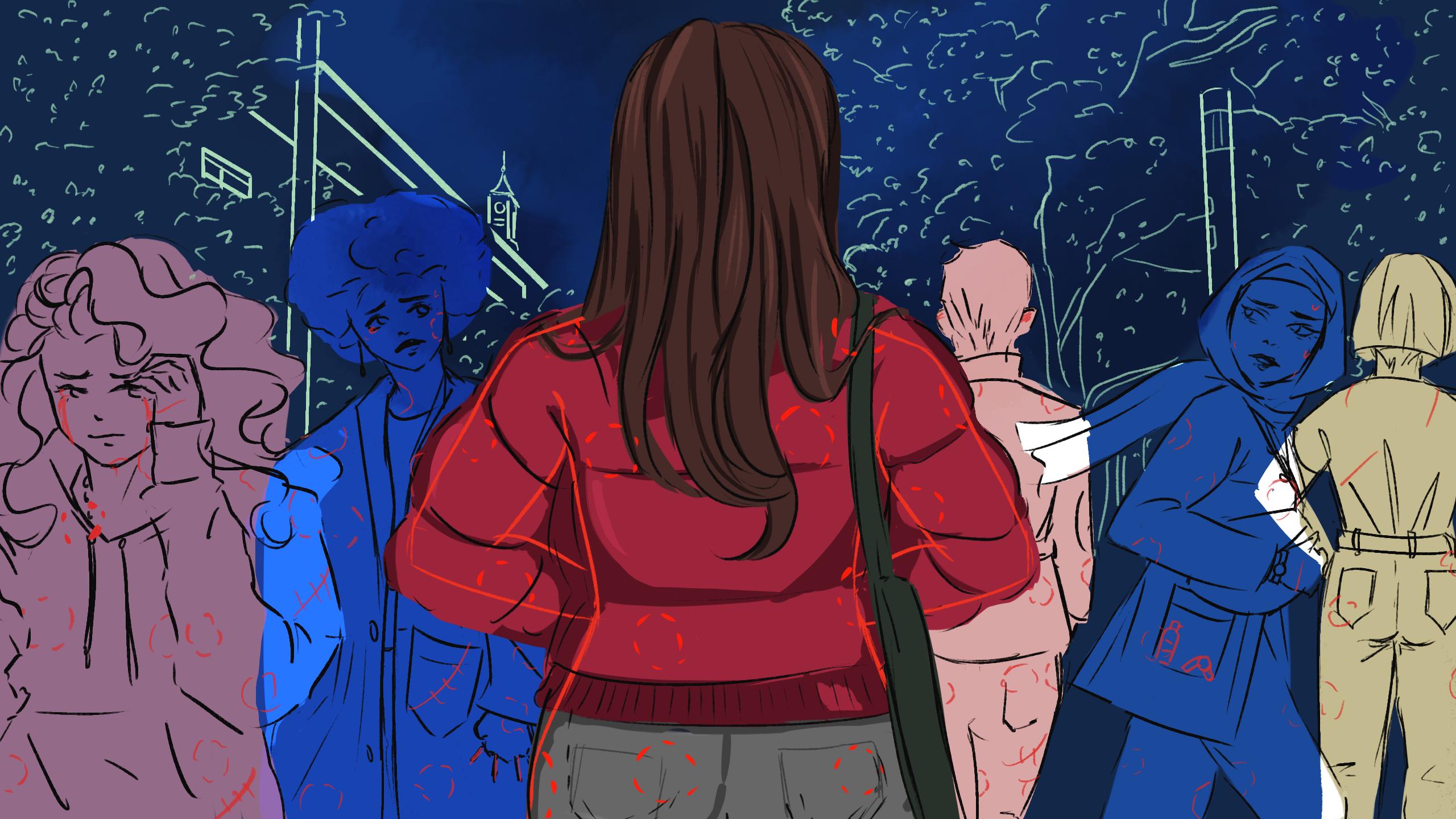While the return to classes is joyous for some, for survivors living near campus, it comes with heightened fear and anxiety of sexual harassment
Words by Mariyah Salhia
Visuals by Laila Amer
CONTENT WARNING: This story discusses sexual violence, including specific incidents of harassment and assault. If you’ve been affected by sexual violence and are in need of help, visit the Sexual Harassment and Assault Research Exchange to find a crisis centre near you. If you are impacted by this story, resources are available at the end of this article.
It was a chilly Wednesday evening in October 2019 and Sam Tinajero was walking home after finishing a workout at the Recreation and Athletic Centre. Even though the sun hadn’t quite set and the weather was still warm enough to forgo layers, Tinajero, a third-year media production student, was wearing a baggy pair of sweatpants and a hoodie underneath a puffy parka, as she made her way to her dorm room in Pitman Hall. With her hood up, her head down and the volume in her headphones low, she crossed through Kerr Hall Quad and made her way out to Gould Street.
As she turned out of the Quad, she noticed a group of four or five men walking toward her just past the archway across from Balzac’s, all of whom were larger than her. Cautiously, she swerved around them and stepped off the sidewalk, when some of them started yelling “Hey baby!” in her direction. She started walking faster. Before she knew it, she could feel one of them coming up behind her, hand grazing her back before she arched her body to avoid being grabbed.
All she remembers from that point forward was running home as fast as she could and breaking down in tears in front of her roommates the minute she walked through the door. Although the incident is still fresh in her mind, she never reported it to the school.

“I don’t even know where to go, I don’t know what to do,” says Tinajero. “It’s sad, but I didn’t think there was anything that could be done. What’s the point of me reporting?”
For many Ryerson students living on or near campus, returning to school after one-and-a-half years of online learning is exciting. It signals a return to some of their favourite parts of campus life that they missed out on like going to parties on a Wednesday night or the rush of finding an empty table to study at. But for women living on campus, a return to in-person activities comes alongside stress and concern over how safe campus will be from sexual harassment.
In February 2020, the Council of Ontario Universities reported that 63.5 per cent of surveyed Ryerson students had experienced sexual harassment. Ryerson’s sexual violence policy defines sexual harassment as: “A course of unwanted remarks, behaviours, or communications of a sexually oriented nature or a course of unwanted remarks, actions that promote gender-based violence.” It also includes “behaviours or communications based on gender where the person responsible for the remarks, actions, behaviours or communications knows or ought reasonably to know that these are unwelcome.”
In September 2020, Statistics Canada reported that around one in 10 students who identify as women were sexually assaulted in a post-secondary setting in 2019.
According to a 2019 report published in the Journal of Family Violence, encounters with sexual assault on campus are experienced disproportionately amongst women and are nearly always detrimental to their mental health, triggering a serious trauma response.
Jennifer Hollinshead is a registered clinical counsellor in British Columbia as well as the founder and clinical director of Peak Resilience, a counselling service designed to help women cope with trauma. Hollinshead focuses on survivors of sexual violence and survivors who choose not to report.
“We have a huge population of university students,” she says. “We see thousands of people a month and I would say, 70 or more per cent have [experienced] sexual harassment, sexual assault, sexual trauma of some kind.”

Farrah Khan, manager of the Office of Sexual Violence Support and Education, also known as Consent Comes First (CCF), says the university is always here to support students who’ve experienced sexual violence of any kind, on and off campus. “If the sexual violence happened off campus, on a date, with a family member, with a coach,” she says. “We’re here to support you.”
When reporting an instance of sexual violence to the university, students must first contact Ryerson’s Human Rights Services. Then, students can file a report or complaint via email, or request an in-person meeting to file a report or formal complaint.
Still, at Ryerson, students say being sexually harassed feels like a part of a routine they never asked for. Thus, the return to living on campus is coupled with dread and fear, as it can mean returning to the place where experiences with sexual harassment feel as common as going from one class to the next.
This fear is widespread across other university campuses as well. Two weeks ago, this fear was realized when at least 30 students at Western University in London, Ont. were drugged and assaulted during the school’s orientation week. According to the Western Gazette, several reports of sexual assault were made by students living at Medway-Sydenham Hall (Med-Syd) on campus. The reports came just one day after the death of a first-year student who was violently assaulted and later succumbed to his injuries near Western University.
Since then, the Gazette said more reports of sexual violence, including several accounts of students being drugged, were filed and an investigation was opened by the London Police Service.
One first-year student at Western recalls running out of the Med-Syd residence and seeing another girl drugged and lying face down on the curb. A frosh leader at the school remembers one of her students saying, “Kids are just passing out, they’re all OD’ing.” One fourth-year student at Western, who also worked as an orientation leader, called the week’s events “horrific” in a Twitter thread. She says students were “dropping like flies” due to drug overdose during a party. Leaders from her team also came across the scene of the first-year student’s death. There were several times where she or her colleagues were “screamed at, pushed and touched inappropriately by men.”
Western students staged a walkout on Sept. 17 to voice their frustration about the school’s lack of action against its longstanding campus culture of sexual violence. A reported 12,000 students walked out of classes to show support for their peers.
Tinajero says it’s also particularly difficult separating the place she was harassed from where she lives—as they’re essentially indistinguishable. “When school is also where you live, it’s really hard.”
According to Brea Hutchinson, the former executive director at the Sexual Assault Centre in Kingston, Ont., it’s common for students to have trouble making that kind of distinction. “Residence is difficult because you have to affiliate all the stress of school with where you live and for some of the women on campus, that includes sexual harassment.”

ust a few months into her first year at Ryerson, Parveen Das* was at a party at the Daphne Cockwell Complex (DCC) residence. In a dorm room with too many people in it, surrounded by half-full solo cups, friends of friends and music she could hardly hear herself over, she was having a good time.
Suddenly, another student tried to grab her hand and body, and when she said she wasn’t interested, he refused to let go. After trying to get him off a few times, she figured it would be easier if she danced with him for a few minutes and then eventually fled from his grasp. “That kind of stuff happens to a lot of people,” she says.
While looking back on her first year at Ryerson, Das, a third-year student at The Creative School, says she can’t even pick just a single moment when she’s been sexually violated as there were many, but that incident always sticks out to her. After spending over a year at home in rural Alberta, she knew that moving back to the downtown core would be stressful.
“The community is a lot different [there],” she says. “In Toronto, it’s a very hustle-type attitude and back home it was just family all the time.”
Das says her skin has gotten tougher since moving to Toronto in her first year, but being sexually harassed is something that is constantly on her mind and other women’s minds when they walk out the door. “Once you start living here you start understanding that you don’t want to walk through Victoria Street in the evenings, or you learn that you do have to worry about your clothes, or if you want to wear AirPods, you have to keep the volume really low,” she says. “You just have to be aware of your surroundings at all times.”
While Das’ housing was right across from the Mattamy Athletic Centre, Ryerson initiatives like the WalkSafe Program—a service where uniformed security guards can walk students to different parts of campus—weren’t always available to her because her apartment was just outside of the program’s boundaries. “I’m really glad to have the security staff and the WalkSafe program available on campus, but for people like me, who have to commute a little, it doesn’t really feel like I get a lot of support.”
Hutchinson says gaps in safety resources on campus, like Ryerson’s WalkSafe Program, are more common than they should be. “I don’t want to sound cheap, but really, it’s about money,” she says. “These programs are underfunded.”

In 2019, the WalkSafe program was used 1,066 times, according to Ryerson. When asked how much funding is given to Ryerson’s WalkSafe program, the university said in an email to The Eyeopener that they were unable to provide a number as “it’s part of the larger budget and is too difficult to disentangle.” The program is part of the Community Safety and Security operating budget, which the university said they were unable to provide, “as internal department budgets are confidential.”
According to the Ontario government, just $6 million was invested “to support sexual violence prevention and campus safety efforts at publicly-funded post-secondary institutions” earlier this year, which reportedly doubled their previous investment. This funding is split between the province’s 22 publicly assisted universities, and 24 publicly assisted colleges. Recently, Ontario’s Ministry of Colleges and Universities announced it’s now requiring post-secondary institutions to update their policies to ensure that students who report sexual violence will not be disciplined for drug and alcohol use when the alleged sexual violence took place.
Hutchinson says community-based sexual assault centres are well-positioned to do this work instead of offices, as they work with students and community members regardless of where they experienced sexual violence, but are significantly underfunded. “Community-based sexual assault centres in Ontario get about $1 funding per person per year across the whole province. The total budget for community-based sexual assault centres is about $15 million in Ontario per year. This core funding has not been increased since 2013,” she says.
Right after becoming a part of one of the school’s athletic teams, Das and her teammates participated in a mandatory CCF training session. In a series of sessions, they learned about services available on campus to students who’d experienced sexual violence, what consent means and security services available to them as students. She remembers everyone on her team taking the training seriously and even remembers other athletes being enthusiastic about completing their online modules.
Ryerson provides mandatory CCF training for all students living in residence, student athletes and several campus student groups. Still, Das says she’d feel safer on campus if it was mandatory for all students. “For me, the training feels like obvious stuff,” she says. “But it’s not obvious to everyone and a lot of [students] don’t live in res and aren’t athletes.”
Das says it’s concerning that there are so many students coming to campus without the understanding of the trauma that accompanies sexual harassment or the supports available to them if they experience it.
“It’s not your first thought when you move to the city, because you think that you can rely on services like Consent Comes First and campus security,” she says. “I don’t know how much of an influx [of sexual harassment] there’s going to be, but I can guarantee a lot of people are going to be learning things very quickly.”

n October of 2019, Christina Flores-Chan was given the opportunity to cover the Toronto Maple Leafs home opener for a student publication on campus. Excitement was rushing through her veins; sports reporting was always her dream and for the then-first-year journalism student, it felt like the opportunity of a lifetime.
She went to the game with her notebook in hand, accompanied by an editor from the publication, who was a fourth-year student at Ryerson at the time. When the game was over, the editor offered to walk Flores-Chan back to her dorm at the DCC. As they walked back to her residence, the editor started making comments about her appearance and ethnicity, making sure to tell her he was “really into Filipino girls” because of how “cute and small” they are.

When they finally reached the lobby, he told her he’d never seen what the residences inside the DCC looked like and strung the conversation along, to Flores-Chan’s discomfort. Feeling powerless, she says she had no choice but to invite him into her dorm. “I was a first-year and he was a fourth-year with control over what stories I got,” she says.
In the following days, Flores-Chan noticed that her story on the game never ran and she didn’t feel comfortable writing for the publication again. Feeling confused about what had happened to her, Flores-Chan talked to her Residence Advisor (RA) about what the editor did. As she recounted the story, her RA informed her that what happened to her was a form of sexual harassment and she could file a formal report about the incident.
When they got in the elevator, he started asking questions. “He said, ‘Are your roommates home? Is your bed big?’” She quickly told him that her roommates were probably there and that her bed was tiny. A little confused, Flores-Chan’s roommates invited the editor into their small living room and tried to make conversation. After a few minutes, he quietly told Flores-Chan and her roommates that he had to work on a group project and showed himself out of the dorm.
However, Flores-Chan decided against it. “At the time, he was still an editor and he was still in fourth year,” says Flores-Chan. “I didn’t want to make a big deal out of it, I thought because he didn’t explicitly force me to do anything and I was the one who invited him up.”
Flores-Chan initially thought it was her fault that it happened. Now in her third year and as a writer with more experience, she knows she wouldn’t be naive enough to find herself in another situation like that. “That’s so fucked up,” she says. “It shouldn’t matter that I was naive, it shouldn’t have happened in the first place.”
Hutchinson says the biggest barriers to reporting are reporting processes in place and a culture that shames and places the responsibility on women for their safety. Hollinshead adds that this kind of reaction is a common trauma response.
“Sometimes I talk to people about responsibility-taking and guilt as your brain’s way of wishful thinking that you could have changed something,” she says. “In an adaptive way, it’s your brain and body trying to take responsibility and control back.”
According to Harvard Business Review, many women who don’t report sexual harassment in the workplace do so because of three main factors: fear of retaliation from their employer; embarrassment caused by the bystander effect; and a need to fit into a male-dominated environment—all of which Flores-Chan says she felt in her first year.
Another time, while sitting in the newsroom, Flores-Chan was sitting with that same editor as they talked about going to parties around campus. He’d told her that a few nights before, he and some friends had tried to get into a residence party.

“Why would you want to party with first-years, you’re a fourth-year?” she asked him. “We’re lame to you.” She remembers him responding with, “They’re first-years, they’re easy,” and then immediately saying, “Just kidding!” with a laugh.
Because of that experience, she’s worried about how safe younger girls might be in residence, especially after a year and a half of schooling from home. “[Incoming students] have been living in lockdown, under a rock for over a year,” she says. “They’re kids, and the second they can do something that someone’s been telling them they can’t, they’re gonna do it.”
Anxieties about incoming students were even further heightened by the news coming out of Western University. “The rumours [about sexual assault], already widespread online, cast a shadow on the final night of Orientation Week events,” reported the Gazette. Western claims to give first-year students “extensive sexual and gender-based violence training,” but first-years “unequivocally refuted” the assertion that anyone was trained, also reported by the Gazette.
So far, Ryerson hasn’t commented directly on the events at Western or how they’re working to ensure that students are protected from that scale of sexual violence. In an interview with The Eye, president Mohamed Lachemi pointed to existing resources like the CCF and the WalkSafe program available for students to use.
Similar to Das, Flores-Chan remembers sitting in a mandatory CCF training during the first couple days of first year after just moving in. In a large lecture hall at the Ted Rogers School of Management building, she noticed that while she was paying attention to the lecture, others around her were falling asleep or fidgeting with beef jerky handed out at Yonge-Dundas Square. “I don’t necessarily think it made me feel safer,” Flores-Chan says. “A lot of people were falling asleep, some people were cracking jokes and I just remember thinking, ‘That’s really disrespectful.’”

ven though Tinajero is excited to get back to campus this year, the anxiety surrounding being back at Ryerson has already set in, especially after spending the pandemic in a quiet suburb just outside of Caledon, Ont.
While the experience she had walking home from the gym was nearly two years ago, it still bothers her. “It still makes me upset every time I walk past that little section on Gould.” The incident still lives in vivid detail in her mind, yet she never learned who harassed her. “It boils my blood to think about if they were students,” she says. “I feel like it hurts more when it’s another student.”
Tinajero knows it wasn’t her fault she was harassed, yet she still thinks about how she didn’t say anything to the men who catcalled her. “You always rehearse the ‘fuck you’ or whatever,” she says. “But in that moment I froze and I never told them how disgusting they were.”
According to Hollinshead, this kind of reaction is very common. “Half the trauma processing is how you think of yourself and how you reacted—evaluating it and the shame in the woulda-coulda-shoulda.”
Tinajero can remember countless examples of seeing or experiencing sexual harassment on campus. For her, one of the saddest parts of hearing the experiences of other women on campus is how normalized it seems to have become.
Sexual harassment is so regular in her life that she can’t make a distinction between “regular Toronto stuff” and things like the Gould Street incident. “There’s always some creepy guy at a party who doesn’t know when enough is enough or someone who looks at you on the TTC,” she says. “We just learn to adapt.”
Tinajero says although she’s been able to overcome some of the stress of being harassed herself, she’s afraid for incoming students. “I’m just worried about all those kids. A girl I know, who’s starting her first-year, reached out to me and asked if I had any tips on how to not get sexually harassed,” she says. “The sad part is I knew exactly what to tell her.”
*Name has been changed to protect source’s privacy and security
Community members who are affected by this story and/or in need of support can contact the following resources:
- Ryerson’s Office of Sexual Violence Support and Education
- Sexual Assault Centres in Ontario: Confidential and free counselling to survivors of recent and historical sexual assault throughout Ontario. Contact a centre to ask about individual or group counselling. Also provide 24-hour, confidential crisis line to reach a counsellor by phone.
- Good2Talk: 24/7 confidential helpline for post-secondary students in Ontario providing referrals about services and supports for mental health, addictions and well-being. 1-866-925-5454
- LGBT Youth Line: Provides confidential phone and text support for 2LGBTQA youth, operating Sunday – Friday 4pm – 9:30PM. Phone: 1-800-268-9688 Text: 647-692-0777
- Trans Lifeline: 24/7 Confidential hotline staffed by transgender people for transgender people. 1-877-330-6366
- Assaulted Women’s Helpline: 24-hour telephone support and counselling available in several languages. 416-863-0511
- Toronto Rape Crisis Centre/Multicultural Women Against Rape: Crisis intervention, counselling and referral for survivors of rape/sexual assault. Open 24 hours. 416-597-8808
- Women’s Support Network of York Region: Provides free, confidential services for women who have experienced sexual violence. 905-895-7313
- Support Services for Male Survivors of Sexual Abuse: Provides help for male survivors of sexual abuse, both recent and historical. Survivors also have access to a 24-hour, multilingual, toll-free phone line for immediate crisis and referral services. 1-866-887-0015
- More resources here












Insiya Fathima Moosavi
Such an important read! Thank you for speaking out about this, Mariyah.
Alistair Gordon
Thanks for sharing a post on such a sensitive issue. Yes, it is indeed true that some people fear of sexual harassment while coming to campus or even within campus. Government should make the law and order system more strict to prevent these sorts of issues as much as possible.